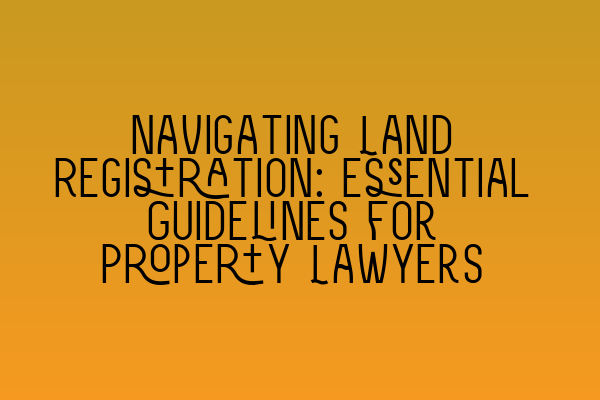Navigating Land Registration: Essential Guidelines for Property Lawyers
As a property lawyer, understanding the intricacies of land registration is essential to ensure the smooth transfer of property rights and the protection of your clients’ interests. This article will provide you with a comprehensive guide to navigating land registration, covering everything from the basics to more complex aspects of the process. So grab a cup of coffee and let’s dive in!
1. The Basics of Land Registration:
The first step in navigating land registration is understanding the basics. Land registration is the process of recording ownership rights and interests in land and creating an official record known as the Land Register. The Land Register includes information about the owner, any mortgages or other charges, and any restrictions or rights affecting the property.
2. Registerable Interests:
Not all interests in land are registerable. As a property lawyer, it is crucial to know which interests can be registered and which cannot. Registerable interests include freehold and leasehold estates, transfers of ownership, mortgages, and easements. Non-registerable interests, such as certain types of leases and rights of occupation, need to be dealt with differently.
3. Application Process:
The application process for land registration involves submitting various forms and supporting documents to the Land Registry. It is important to ensure that all the required information is provided accurately and in a timely manner. Failure to do so can result in delays or even rejection of the application.
4. Priority of Interests:
Understanding the concept of priority is crucial in land registration. Priority determines the order in which competing interests are ranked. Generally, the first interest to be registered has priority over later interests. However, certain interests, such as overriding interests, may take priority even if not registered. It is essential to conduct thorough searches and investigations to determine the priority of interests.
5. Boundaries and Plans:
Defining the boundaries of a property is an integral part of land registration. This includes creating accurate plans and determining any disputes or uncertainties regarding boundaries. Property lawyers must work closely with surveyors and other experts to ensure that the boundary descriptions and plans in the registration accurately reflect the physical boundaries.
6. Overriding Interests:
Overriding interests are interests that are not required to be registered but still take priority over registered interests. Examples include rights of occupation, certain leases, and certain types of easements. As a property lawyer, it is crucial to identify and properly deal with overriding interests to protect your clients’ rights and interests.
7. Restrictions:
Restrictions are limitations or conditions imposed on the registered title. They can include requirements for consent or notice before transactions can be completed. It is important to review the restrictions carefully and advise your clients accordingly. Failure to comply with restrictions can have serious consequences, including voiding the transaction.
8. Dealing with Unregistered Land:
Not all land is registered, especially older properties. When dealing with unregistered land, additional steps need to be taken to establish ownership and protect your clients’ interests. This often involves examining old title deeds, historical documents, and conducting thorough investigations to trace the history of ownership.
9. Ongoing Responsibilities:
Once a property is registered, property lawyers have ongoing responsibilities to maintain the accuracy of the registered information. This includes updating the Land Registry with any changes, such as transfers of ownership or creating new leases. Regularly reviewing the registered title is crucial to ensure no unauthorized changes or interests have been added.
In conclusion, navigating land registration is a complex process that requires a thorough understanding of the law and attention to detail. As a property lawyer, it is essential to stay updated on changes in land registration rules and practices. By following these essential guidelines, you can effectively protect your clients’ interests and ensure a smooth and successful transfer of property rights.
For more information on related topics, check out these articles:
– Understanding Contractual Capacity: Rights and Limitations
– Interactive SQE Mock Tests for Contract Law: Test Your Knowledge
– Join Our SQE Contract Law Webinars: Expert Insights and Guidance
– SQE Prep: Mastering the Essentials of Contract Law
– Contractual Capacity: Understanding Legal Competence in Contracting Parties
Keep up-to-date with the latest developments in land registration and continue to enhance your expertise in property law.
